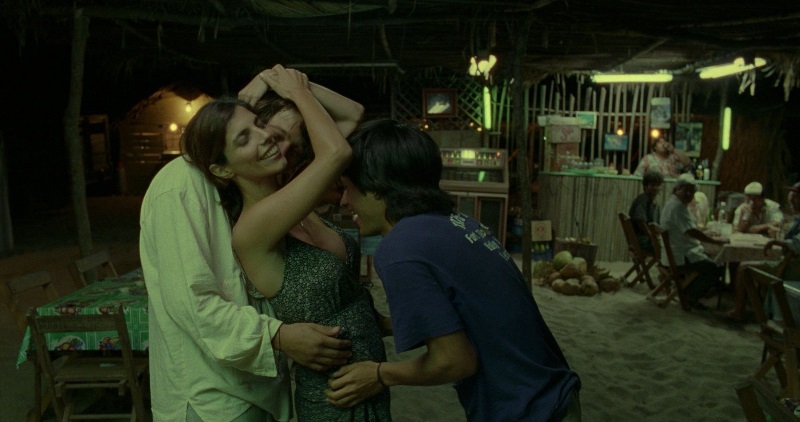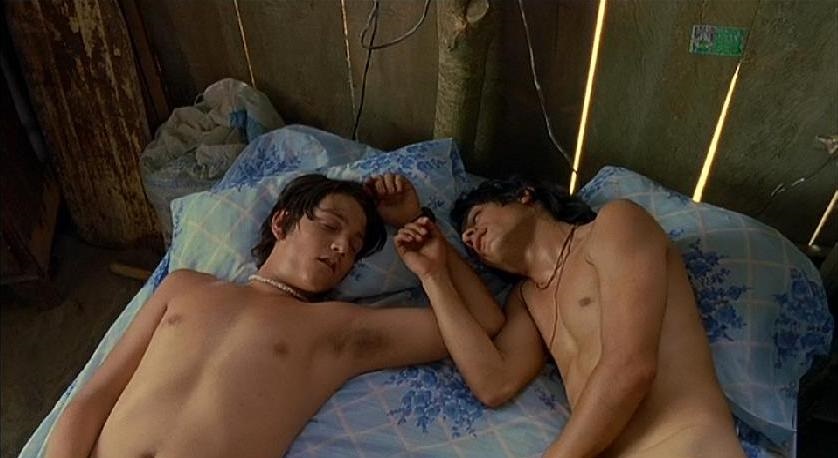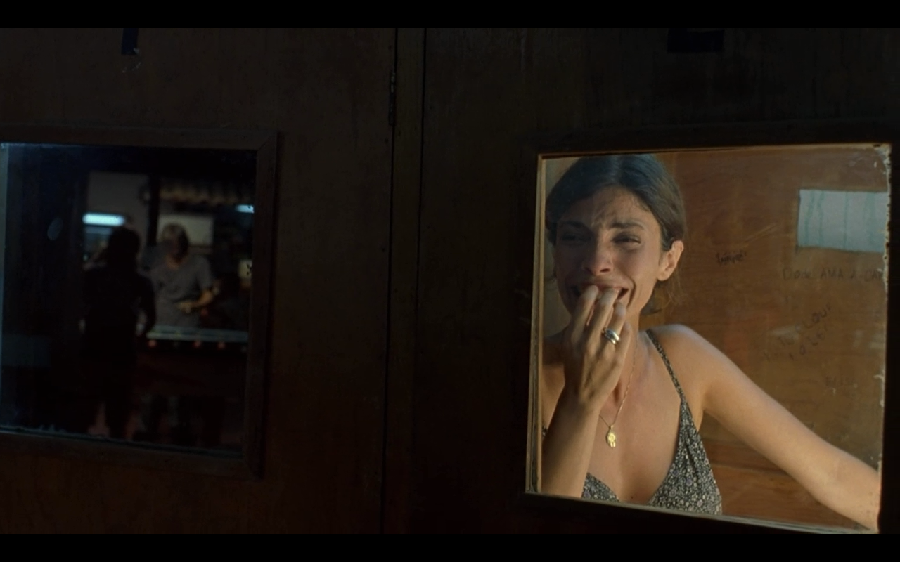Welcome back to Foreign Film Fridays, where I talk about some of my favorite non-English language films! (And yes I know it’s Thursday, but I have a new review planned for tomorrow, so stay tuned!) Today we’re going back to turn-of-the-century Mexico and the breakthrough film for a future Oscar winner: Alfonso Cuarón. Y Tu Mamá También stars Gael Garcia Bernal and Diego Luna as Julio and Tenoch, two upper-class teens who embark on a spontaneous road trip across Mexico with Luisa (Maríbel Verdú), a woman ten years their elder.
I had this film on my watch list for many years but never got around to it until just last month. I decided to put it on in preparation for Cuarón’s upcoming film Roma, which will be a return to a more grounded examination of his home country, Mexico. This film was well-received but largely passed over for awards consideration, though it did snag an Oscar nom for Best Original Screenplay (a rarity for a foreign film). It was controversial at the time for its explicit sexuality and drug references, perhaps dampening its impact and exposure with many viewers. But setting that aside, this is a masterful work that manages to mask its complexity behind a facade of realism, working on multiple levels at once. For this reason, I didn’t feel comfortable sharing my thoughts on the film until I’d let it sit for a while and then watched it a second time with a better sense of what to look for. And after doing so, I can conclude that this is one of the best films I’ve ever seen, foreign or otherwise. *SPOILERS AHEAD!*
Sexuality and Identity

The explicit sex shown throughout the film does not hold back: we see basically everything short of penetration. But it is not gratuitous or objectifying; in fact, it is an essential element to the film’s theme. Sex is used for multiple purposes throughout the film: as a vehicle for character development, as a metaphor for the degrading friendship of the two boys, and as a decoy for the hidden themes and messages of the film.
Our protagonists, Julio and Tenoch, express themselves predominantly through their sexuality. They bond almost exclusively through sex, talking about it constantly and basing their friendship on their similar tastes in women. Luisa recognizes this about the boys almost immediately: in the early stages of the road trip, she encourages them to talk about sex with her in order to gauge their personalities and desires. She also talks about her own sex life in small doses, but usually from a more philosophical perspective or to get the horny boys to open up. Luisa even has sex with both of them, quite early on in the film in fact, in order to dissipate sexual tension and get beyond their surface-level infatuation with her. She is not naive to their primal attraction to her and in fact plays into it, seeking to cut through their urges and get at the heart of what actually makes them tick.

There is a homoerotic undertone to Julio and Tenoch’s relationship, which is foreshadowed several times throughout the film. Their closest bonding moments come when they are comparing dick sizes, or fantasizing about women together and bragging about their exploits, or literally jerking off together. They roughhouse naked in the showers and skinny-dip in the pool together, not in an explicitly erotic or sensual sense, but in a suggestive manner all the same. Luisa pokes fun at this fact herself when she suggests that they simply “fuck each other” instead of continuing their sexual pursuit of her. And at the end of the film, when Luisa pleasures the two boys at once, they embrace and kiss each other, the lines blurred between their sexual camaraderie and attraction. Even the title of the film makes reference to this: as the boys attempt to one-up each others’ sexual exploits, the ultimate trump card is played: “I fucked your mother, too.” We all know how Freud would analyze this: the boys’ desire to be close to one another has evolved into a desire to return to the wombs of the other. The boys appear to put up fronts against such deviant behaviors, frequently deriding their friends using homophobic slurs and more or less ending their friendship once they realize what they’ve done in the morning. I don’t think the intended message is that the boys were gay the whole time, rather that their shared exploits created a physical bond that went beyond mere friendship.
Sex is also used as a distraction from what’s actually happening in a scene. The term “sexposition” has been used before for plenty of films and shows, most notably Game of Thrones or The Big Short, as a technique to hide exposition dumps behind sexual encounters. Y Tu Mamá También takes a similar yet opposite approach, using sex to distract the audience from the hidden layers of the film. Many of the film’s racier scenes and discussions happen concurrently with moments of great strife and hardship in the background (which will be discussed later). As our main characters discuss how to pleasure a woman or what their dicks look like, we see impoverished Mexican families struggling to get by in the small towns they drive through, and political demonstrations and acts of violence hidden in the corners of the frame. Sex is both celebrated as an act of passion and joy, yet exposed as a frivolous luxury of life in the midst of human suffering. And as audience members are drawn into the will-they-won’t-they sexual tension of our protagonists, they might miss the subtext of the scene that the sex is meant to deflect.
The Omniscient and Disruptive Narrator

The film is notable for its technical realism, refusing to use cranes or Steadicam or anything else that might break the immersion of the grounded story. The one exception to this is the voiceover narration, which cuts in every so often to provide additional insight into a character or an event on-screen. This narrator knows all, including secrets about characters that they don’t share with others or even acknowledge in themselves; or political commentary on Mexico at the time, placing the film within a historical context. The closest comparison to the narration style would be the show Arrested Development, which mostly uses narration for metahumor and satire. Y Tu Mamá También‘s narration fills a similar function; while it isn’t primarily used for comedy, it does serve to juxtapose what’s happening on-screen and add context to a moment that can’t be delivered by traditional dialogue.
One technique Cuarón uses is to hard-cut all audio for roughly one second before the narrator speaks. This is intentionally jarring and immersion-breaking, as if to pry the audience away from the experience for a moment to hear an important piece of information. A similar audio-cutting tactic is utilized in David Lynch’s masterpiece Mulholland Drive (coincidentally in the same year) in order to remind the audience that what we are seeing is an illusion: movie magic, or the wool being pulled over the audience’s eyes (“There is no band”). It almost creates a nature-documentary feel to the film, like we’re watching a group of primal animals from afar as David Attenborough narrates their existence.

We occasionally learn things from the narrator that we never would have learned through traditional exposition. When Julio and Tenoch each learn that the other has slept with their girlfriend, the narrator describes the feeling as akin to a repressed childhood memory of their parents. We also learn small factoids and trivia about the boys, such as a tendency to lift a toilet seat with their feet or to light a match when using the bathroom…small quirks that help to flesh them out in our minds. And the secretive nature of these quirks is important to the theme of hiding one’s true nature from those you care about. Inserting an artificial and all-knowing narrator serves to draw attention to this theme of hidden personality, never missing a moment to expose a character in a lie. Which harkens back to the Arrested Development narrator, often undermining or contradicting the characters, calling them out on their bullshit (“He didn’t”).
The narration is also used to ground the film in reality whenever the audience is at risk of taking Julio and Tenoch’s story too seriously. As we’re getting invested in the sexual tension with Luisa, the narrator butts in to remark on her tragic backstory, or the historical significance of the town they’re driving through. It acts as a sobering counterweight to the carefree nature of the basic plot. For instance, when they enjoy a fun day at the beach with fisherman Chuy and his family, the narrator remarks that Chuy will soon be run out of town by the boating lobby after a new hotel is built nearby. It puts a new lens on the interaction with the locals and reminds us that these are two ignorant teenagers coasting in the generosity of people far less fortunate than them. If every moment of narration was removed, we would have a fun teen road trip film with some coming-of-age elements and raunchy humor. Instead, we have a more comprehensive and frank examination of two boys’ charmed existence within a tormented and suffering universe, framing the petty and juvenile subject matter as just that.
Hidden Layers

Does anyone remember that PSA from a few years ago showing a cute high school couple flirting at school, in which a school shooter plans his attack in the background? This film employs a similar tactic of masking background action with foreground intrigue. So much is happening in the background of shots that you could almost argue that there are two separate films happening on-screen at once.
The camera occasionally leaves our main characters in order to focus on something else happening nearby. The boys and Luisa drive through impoverished neighborhoods and see some distressing activities go down that they do not acknowledge. A man hit and killed by a truck on the highway. A poor family begging for money for a wedding. A military unit harassing a group of street vendors. The boys are largely unaffected by this poverty happening all around them; they live life in a bubble, shielded from hardship by their privileged upbringings. Cuarón is both able to convey this detachment and allow the audience to take in the misery of the land at once. A passive viewer could enjoy the surface-level story of two horny bros on a fun summer road trip with a hot chick, while an active viewer can recognize the juxtaposition of their frivolous existence with the turmoil of 1990’s Mexico raging around them.

In addition to the depth happening in the background visually, there is a hidden layer apparent in our main characters as well. Both Julio and Tenoch appear confident with their lives and identities when in fact the very opposite is true. Both boys harbor deep insecurities about their self-worth and desires, only gradually revealed through plot development. The boys are bold and loud about their moral codes, like their iron-clad manifesto, but upon experiencing jealousy and inequality for the first time, they turn on one another, uncomfortable with the notion that they might fall short of expectations. And it goes beyond the surface-level of sex, like dick shape/size or endurance in the sack, to a deeper fear of inadequacy and failure. One could argue that the boys are not ignorant of the poverty surrounding them so much as they are willfully shutting it out in order to stave off their anxieties about falling prey to a less-than-idyllic existence like the rest of Mexico.

Luisa has the most obtuse motivations throughout the narrative, and as such provides the biggest gut-punch at the end of the film when we learn her true story. Since we view the story mostly through Julio and Tenoch’s eyes, we are wondering along with them why this bombshell of a woman is devoting herself to these immature teens lusting after her. At multiple stages we think we understand her desires, only to have the rug pulled out from under us. She agrees to the road trip after her husband cheats on her, which is an understandable-enough justification for a spontaneous adventure. But as she goads on the boys’ desires and submits to their sexual aggressions, we again wonder why she is pursuing these young boys she clearly has no specific attraction to. It isn’t until the final scene that we learn in hindsight that she was dying from cancer and wanted one last fun fling before she passed. Her cheating husband was a ruse intended to obscure her true motivations: she feels stifled in her upscale married lifestyle and wants to experience life at its most primal one last time.
By skewing these motivations and forcing us to wonder what’s really going through everyone’s minds, Cuarón once again rewards the active audience and incentivizes us to look beyond the surface level to glean meaning. We must learn to take everything with a grain of salt and take the full body of behavior from each character to understand them, not just what they want us (and each other) to see. It can be easy to become distracted by the gorgeous cinematography or the steamy sensuality of the film, but for those able to appreciate the implication of a scene moreso than the literal translation, there is a gold mine of depth hidden just under the surface.
Conclusion

Ever since watching Y Tu Mamá También a few weeks ago, I have been unable to stop thinking about it. It’s a powerful film that works on multiple levels, representing the very best that film can be, foreign or not. In fact, I appreciate that it is not in English even more than usual; I have a bad habit of texting or multitasking while watching a movie at home, so being forced to pay attention and read the subtitles caused me to take in the entire experience and enjoy its subtleties that much more. There is so much subtext going on, so much disconnect between audio and visuals and spoken vs. unspoken truths, that it will take time for most viewers to understand everything that’s going on. I’m even more stoked now for Roma than I was before, as Cuarón has proven that he understands film language and subtlety regardless of subject matter. Given enough time, this film might even slip into my Top 5 all-time. I’m serious…the movie is that fucking good. Go watch it on Netflix right now.
VERDICT: A+
-Austin Daniel
All image rights belong to 20th Century Fox.
In other news: October is finally here, which means good movies are finally back in theaters! Expect a slew of new reviews on this site over the coming weeks, including A Star is Born, First Man, Bad Times at the El Royale, The Sisters Brothers, The Old Man and the Gun, and Beautiful Boy. Check back periodically for my thoughts on each!
4 thoughts on “Foreign Film Fridays: “Y Tu Mamá También” (Mexico, 2001)”